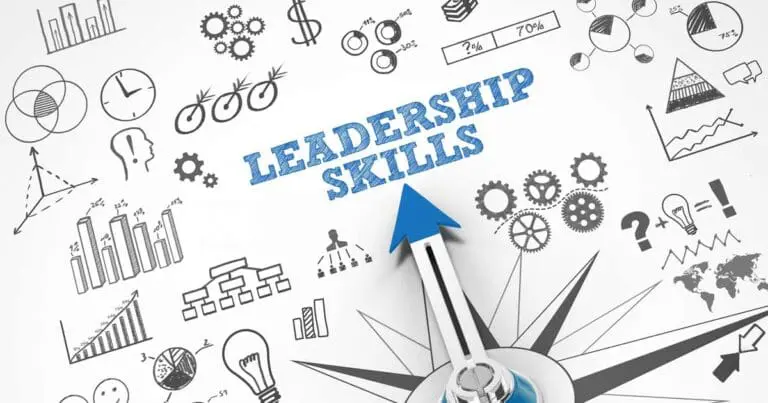Top Leadership Skills, Traits & Qualities to Advance Your Career

Leadership skills are essential to progressing in your career. They can help you manage and motivate teams, make better decisions, and achieve success.
Leaders are in high demand in today’s workforce and having strong leadership skills can make the difference between getting ahead and staying stuck in the same place.
While many think leadership skills are innate and can’t be learned, there are skills you can develop to become an effective leader and grow professionally to advance your career.
What are leadership skills?
Leadership skills are defined as the set of innate and learned skills that allow you to lead and influence others.
Some leadership skills are essential for all leaders while others may be specific to an industry or company culture. The most effective leaders have a mix of both soft and hard skills.
Leadership skills at work:
- Communication
- Transparency
- Conflict resolution
- Problem-solving
- Listening
- Empathy
- Resilience
- Curiosity
- Authenticity
- Delegation
- Adaptability
- Self-awareness
Top Leadership skills to advance your career at work:
1. Communication in leadership
The ability to communicate effectively is one of the most important leadership skills. Leaders need to be able to share their vision and inspire others to achieve it.
They also need to be able to give clear instructions and feedback. Effective leaders are excellent communicators both verbally and written.
2. Transparency in leadership
Transparency is important for leaders because it builds trust. When leaders are open and honest about their decisions, it shows that they have nothing to hide.
It also allows others to see the reasoning behind the leader’s choices and build buy-in for their vision.
3. Conflict resolution in leadership
Leaders need to be able to resolve conflict effectively. This means being able to see both sides of an issue and finding a compromise that everyone can agree on.
It’s also important for leaders to be able to defuse tense situations and arguments before they escalate.
4. Problem-solving in leadership
Leaders are often the ones who need to solve complex problems. This means thinking outside the box and coming up with creative solutions.
It also requires being able to break down a problem into smaller pieces to find a way to fix each individual component.
5. Listening in leadership
One of the most important leadership skills is the ability to listen. Leaders need to be able to hear what their team members are saying and understand their needs.
They also need to be able to listen to criticism and use it to improve their own performance.
6. Empathy in leadership
Empathy is the ability to understand and share the feelings of another person.
It’s an important leadership skill because it allows leaders to connect with their team members on a deeper level.
Empathetic leaders are able to build trust and loyalty among their teams.
7. Resilience in leadership
Resilience is the ability to bounce back from setbacks. Leaders need to be able to handle stress and adversity.
They also need to be able to pick themselves up after a failure and continue moving forward.
8. Curiosity in leadership
Leaders need to be curious in order to learn and grow. They need to be willing to try new things and take risks.
Curiosity also allows leaders to see problems from different perspectives and find innovative solutions.
9. Authenticity in leadership
Authenticity is the ability to be yourself and leaders need to be comfortable in their own skin.
Employees are leader watchers and they can sense when someone isn’t being fully themselves.
This is why leaders need to be able to build trust by being honest and transparent with their team members.
10. Delegation in leadership
Delegation is the ability to assign tasks and responsibilities to others. Leaders need to be able to delegate effectively in order to get things done.
They also need to be able to trust their team members to handle tasks on their own.
11. Adaptability in leadership
Adaptability is the ability to change and adjust as needed. Leaders need to be able to adapt to new situations and challenges.
A healthy team and successful company are always growing and evolving so the ability to manage change effectively and help their team members through it, is crucial.
12. Self-awareness in leadership
Self-awareness is the ability to understand your own strengths and weaknesses. Leaders need to be aware of their own limitations in order to be successful.
They also need to know when to ask for help from others as a way to build the strength of their team and scale success.
Using leadership skills to grow your career
The ability to develop and grow top leadership skills is important for anyone looking to advance their career.
Each of the skills listed above is essential for leaders. However, it’s also important to remember that leadership is not a one-size-fits-all proposition.
The best way to find out which leadership style and skills work best for you is to experiment and learn from your mistakes.
The most important thing is to keep growing and developing as a leader so that you can reach your full potential.
Looking for your next leadership gig? Let us help.
Every year, Mondo helps over 2,000 candidates find jobs they love.
More articles about job searching and industry trends:
- Interview Tips for Introverts: How to Ace Your Interview
- How to Write a Resume When You Have No Work Experience
- Cliche Interview Answers to Avoid & What to Say Instead
- Pandemic-Related Interview Questions & How to Answer Them
- 7 Things to Never Say to a Recruiter When Looking for a Job
- The 9 Workplace Soft Skills Most Valued By Employers
- Best Questions to Ask to Impress Hiring Managers



